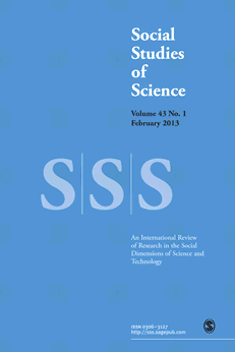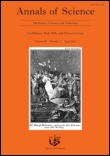
Spontaneous Generations-Journal for the History and Philosophy of Science
metrics 2024
Advancing Knowledge at the Crossroads of Science and Philosophy
Introduction
Spontaneous Generations: Journal for the History and Philosophy of Science is a dedicated publication focusing on the rich fields of history and philosophy within the scientific domain. Published by the Institute for the History and Philosophy of Science and Technology, this journal provides a vital platform for scholars, researchers, and students to explore and disseminate ideas that bridge the historical context and philosophical inquiries of scientific practices. With its commitment to open access, Spontaneous Generations ensures that groundbreaking research is widely available, fostering an environment of collaboration and knowledge sharing. Aiming to engage a diverse audience, this journal is pivotal for those looking to understand the evolution of scientific thought and its implications on contemporary issues, making it an essential resource in the academic community.
Metrics 2024
 -
- -
- 0.80
0.80 -
-Metrics History
Rank 2024
IF (Web Of Science)
JCI (Web Of Science)
Quartile History
Similar Journals

PHILOSOPHY OF SCIENCE
Exploring the Depths of Scientific InquiryPHILOSOPHY OF SCIENCE, published by Cambridge University Press, serves as a premier journal at the intersection of history, philosophy, and science, making significant contributions to our understanding of scientific inquiry and its historical contexts. With an impressive impact factor reflected in its 2023 Category Quartiles—ranking Q1 in History, Q1 in History and Philosophy of Science, and Q1 in Philosophy—this journal stands out as a vital resource for researchers, professionals, and students alike. Operating without Open Access, it encourages the dissemination of groundbreaking ideas from 1949 through 2024, illustrated by its robust Scopus rankings, including a remarkable 98th percentile in the History category. Based in the United Kingdom at the prestigious Cambridge campus, PHILOSOPHY OF SCIENCE is committed to fostering scholarly dialogue and advancing critical thought in the philosophy of science.

Sociologia Nauki i Tehnologij-Sociology of Science & Technology
Fostering Dialogue on the Societal Dimensions of Scientific ProgressSociologia Nauki i Tehnologij-Sociology of Science & Technology is a distinguished journal dedicated to exploring the intricate relationships between science, technology, and society. Published by the Institute of History of Science and Technology, Saint Petersburg Branch, Russian Academy of Sciences, this journal serves as a vital platform for interdisciplinary research and discourse within the fields of sociology, science studies, and technology assessment. The journal encourages contributions that delve into the societal implications of scientific advancements and technological innovations, making it essential reading for researchers, professionals, and students alike. Although specific impact factors and access options are currently not provided, the journal is committed to maintaining high academic standards and fostering a rich scholarly community. Join us in advancing the understanding of how science and technology shape human experiences across diverse contexts.

HISTORY AND PHILOSOPHY OF THE LIFE SCIENCES
Connecting Historical Contexts with Philosophical Inquiry in Life SciencesHISTORY AND PHILOSOPHY OF THE LIFE SCIENCES, published by SPRINGER INT PUBL AG, stands as a leading peer-reviewed journal dedicated to exploring the intricate relationships between historical narratives and philosophical frameworks in the life sciences. With its robust impact factor and recognized position as a Q1 journal in key categories such as Arts and Humanities, History, and History and Philosophy of Science, this journal provides a vital platform for researchers, professionals, and students seeking to delve into the theoretical underpinnings and historical trajectories shaping contemporary life sciences. Established in 1979 and evolving through its converged years until 2024, it reflects the journal's enduring commitment to advancing scholarly discourse in its field. While the journal is not open access, it nonetheless attracts a diverse readership, facilitating meaningful research exchanges and interdisciplinary dialogues. Located in the picturesque country of Switzerland, the journal invites contributions that foster critical examination and innovative thinking in the historiography and philosophy of life sciences, ultimately enhancing our understanding of this dynamic and significant discipline.

SOCIAL STUDIES OF SCIENCE
Advancing Interdisciplinary Insights into Science DynamicsThe SOCIAL STUDIES OF SCIENCE, published by SAGE PUBLICATIONS LTD, is a prestigious academic journal that has been at the forefront of interdisciplinary research since its inception in 1971. With an ISSN of 0306-3127 and an E-ISSN of 1460-3659, this journal serves as a vital platform for exploring the complex interactions between science, technology, and society. Well-recognized in the academic community, it boasts an impressive impact factor and is ranked in the Q1 quartile within major categories such as History, History and Philosophy of Science, and General Social Sciences, placing it in the top echelons of its field. Scopus rankings further emphasize its significance, notably achieving rank #9 out of 1760 in Arts and Humanities for History and a 99th percentile rank. This journal encourages Open Access for maximized outreach, although specific open access options are currently limited. The SOCIAL STUDIES OF SCIENCE is essential for researchers, professionals, and students alike, aiming to foster a deeper understanding of how scientific practices shape, and are shaped by, societal dynamics.

Foundations of Science
Fostering Dialogue on Science's Historical JourneyFoundations of Science is a renowned academic journal published by SPRINGER, dedicated to the interdisciplinary exploration of both the historical and philosophical dimensions of science. Established in 1995 and based in the Netherlands, this journal has carved out a significant niche within the History and Philosophy of Science and Multidisciplinary fields, holding an impressive Q2 ranking in both categories as of 2023. The journal's rigorous peer-review process ensures the dissemination of high-quality research, supported by its Scopus rankings, which place it in the top 15% of its peer group in History and Philosophy of Science and the top 28% in Multidisciplinary studies. Although not an open-access journal, Foundations of Science remains accessible through various academic channels, making its vital contributions to the discourse surrounding scientific foundations available to a broad audience. By fostering dialogue across disciplines, it plays a crucial role in advancing the understanding of science's philosophical underpinnings and its historical development, making it an essential resource for researchers, professionals, and students alike.

History of Geo- and Space Sciences
Unveiling the past to illuminate the future of planetary sciences.History of Geo- and Space Sciences is a distinguished open-access journal published by COPERNICUS GESELLSCHAFT MBH since 2010, committed to advancing knowledge in the interdisciplinary fields of Earth and planetary sciences as well as the history and philosophy of science. Based in Germany, this journal operates under ISSN 2190-5010 and E-ISSN 2190-5029, providing a platform for researchers, professionals, and students to disseminate and access high-quality scholarly articles. With a remarkable impact reflected in its 2023 Scopus rankings, placing it in Q3 for Earth and Planetary Sciences (miscellaneous) and Q2 for History and Philosophy of Science, the journal plays a crucial role in fostering dialogue and collaboration among the scientific community. It not only covers significant advancements in geo-sciences but also addresses historical perspectives and philosophical inquiries that shape our understanding of the discipline. Engage with groundbreaking research and broaden your insights by contributing to or reading articles from this pivotal journal.

ANNALS OF SCIENCE
Unveiling the Rich Tapestry of Scientific ThoughtANNALS OF SCIENCE, published by Taylor & Francis Ltd, is a pivotal journal in the field of the History and Philosophy of Science, as evidenced by its Q3 categorization and a respectable Scopus rank of 99 out of 223, placing it in the 55th percentile among its peers. With a rich history dating back to its initial publication in 1936, the journal has made significant contributions to scholarly discourse, providing a platform for researchers and academics to explore the intricate connections between scientific developments and philosophical inquiries. The journal's commitment to rigorous academic research ensures that it remains a vital resource for professionals, educators, and students dedicated to understanding the evolution of scientific thought. Although it operates under traditional subscription models, the journal's importance in shaping modern scientific discussions cannot be overstated, making it an essential read for those engaged in the multifaceted study of science's history and philosophical implications.

Early Science and Medicine
Revealing the Intersections of Knowledge and HealingEarly Science and Medicine is a renowned academic journal published by BRILL, dedicated to exploring the intersections between historical and medical studies. With a distinguished history since its inception in 1996, the journal caters to an interdisciplinary audience, encompassing vital aspects of History, History and Philosophy of Science, and Medicine. It enjoys commendable rankings, being in the Q2 quartile in History, among others, reflecting its significant contribution to these fields. The journal's editorial commitments aim to advance scholarly discussions on the development of medical practices, theories, and their historical contexts, making it an essential resource for researchers, professionals, and students alike. Although currently not open access, Early Science and Medicine offers comprehensive analyses and rich content that engage with and enrich our understanding of the complex relationship between science and medicine throughout history. For more information, you can find the journal at its esteemed address in Leiden, Netherlands.

Revista Colombiana de Filosofia de la Ciencia
Fostering Open Access to Philosophical InsightsRevista Colombiana de Filosofia de la Ciencia, published by UNIV EL BOSQUE, stands as a pivotal platform for the dissemination of knowledge in the field of philosophy of science. With a commitment to open access since 2010, this journal not only enhances the accessibility of crucial scholarly work but also encourages collaboration and dialogue among researchers, professionals, and students alike. Featuring an ISSN of 0124-4620 and an E-ISSN of 2463-1159, the journal fosters critical discussions on the implications and underpinnings of scientific thought, promoting an enriched understanding of how philosophical frameworks can shape scientific practices. The journal aims to bridge disciplines, inspiring new research pathways while contributing to the philosophical discourse surrounding science in Latin America and beyond. This dedication places the Revista Colombiana de Filosofia de la Ciencia as a leading voice in its field, making it an essential read for anyone looking to deepen their engagement with the philosophy that informs scientific investigation and theory.

Notes and Records-The Royal Society Journal of the History of Science
Charting the Historical Landscape of ScienceNotes and Records - The Royal Society Journal of the History of Science is an esteemed scholarly journal published by the Royal Society in the United Kingdom, focusing on the historical aspects of science and its impact on modern scientific practices. With an ISSN of 0035-9149 and E-ISSN 1743-0178, this journal serves as a vital platform for researchers, professionals, and students who seek to explore the intricate connections between historical developments and contemporary scientific discourse. Recognized for its academic rigor, it holds a commendable position in the Q3 category of the History and Philosophy of Science field, ranking #56 out of 223 according to Scopus, and showcasing a 75th percentile ranking. Covering converged years from 1970 to 1973 and from 1975 to 2024, the journal publishes articles that contribute significantly to the understanding of the evolution of scientific thought. While it currently does not operate under an open access model, its esteemed content continues to engage a broad readership, fostering a deeper appreciation for the history behind scientific innovation and inquiry.